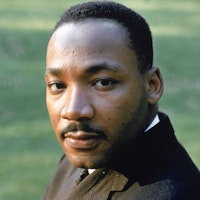Then we love our enemies by realizing that they are not totally bad and that they are not beyond the reach of God’s redemptive love.
Then we love our enemies by realizing that they are not totally bad and that they are not beyond the reach of God’s redemptive love.
Martin Luther King Jr.

Redemptive Love
Theme: Love
When we look beneath the surface, beneath the impulsive evil deed, we see within our enemy-neighbor a measure of goodness and know that the viciousness and evilness of his acts are not quite representative of all that he is. We see him in a new light. We recognize that his hate grows out of fear, pride, ignorance, prejudice, and misunderstanding, but in spite of this, we know that God’s image is ineffably etched in his being. Then we love our enemies by realizing that they are not totally bad and that they are not beyond the reach of God’s redemptive love.
Martin Luther King Jr. was born on January 15, 1929, in Atlanta, Georgia, as Michael Luther King Jr., but later changed his name to Martin. He came from a family of pastors, with his grandfather and father both serving as pastors at the Ebenezer Baptist Church. Martin Luther King Jr. attended segregated public schools and graduated from high school at the age of fifteen. He went on to earn his B.A. degree in 1948 from Morehouse College, where his father and grandfather had also graduated.
After completing three years of theological study at Crozer Theological Seminary, where he was elected president of a predominantly white senior class, King received his B.D. degree in 1951. He then pursued graduate studies at Boston University, where he met and married Coretta Scott. King completed his doctorate in 1955 and had two sons and two daughters with Coretta. Throughout his life, Martin Luther King Jr. played a crucial role in the civil rights movement, advocating for racial equality and justice through nonviolent means. His leadership and inspiring speeches, such as his famous "I Have a Dream" speech, made him a prominent figure in the fight against segregation and discrimination. In 1964, he was awarded the Nobel Peace Prize for his efforts to promote peaceful change and equality for African Americans. Tragically, Martin Luther King Jr. was assassinated on April 4, 1968, but his legacy as a champion of civil rights continues to inspire people around the world.
Strength To Love
Wilson, Andrew, editor. World Scripture II. Universal Peace Federation, 2011, p. 679 [Martin Luther King, Jr. (Strength To Love, Martin Luther King, Jr.)].

Martin Luther King Jr.
Theme: Love

About This Martin Luther King, Jr. Quotation [Commentary]
In Strength to Love, Martin Luther King Jr. writes that we love our enemies by “realizing that they are not totally bad and that they are not beyond the reach of God’s redemptive love.” This begins, he says, by looking “beneath the surface, beneath the impulsive evil deed” to see “a measure of goodness” in the enemy-neighbor. The “viciousness and evilness” of a person’s acts are “not quite representative of all that he is.” Refusing to define another solely by wrongdoing allows us to respond in ways that do not close the door to their humanity.
He calls this seeing “in a new light.” This view recognizes that hate often “grows out of fear, pride, ignorance, prejudice, and misunderstanding,” yet “God’s image is ineffably etched” in every human being. Acknowledging this image affirms the worth of each person, even when their actions obscure it. This challenges the tendency to reduce people to their worst moments and invites a broader, more truthful view of who they are.
Holding that no one is “beyond the reach of God’s redemptive love” makes reconciliation possible without excusing harm or abandoning justice. This love is a deliberate moral choice—to see the good that remains and to act in ways that may help it emerge. In doing so, even one who has caused harm is invited into the same redemptive process needed by all.
Martin Luther King, Jr. In Strength to Love
In Strength to Love, Martin Luther King Jr. insists that “Darkness cannot drive out darkness; only light can do that. Hate cannot drive out hate; only love can do that.” He draws directly on Jesus’s command to “love your enemies”—not as sentiment, but as a moral necessity that breaks the cycle of retaliation. This “creative, redemptive goodwill” refuses to return injury for injury and instead confronts evil with transforming compassion. King calls this the “power of love in overcoming evil,” a strength that turns the oppressor from enemy to neighbor without surrendering the struggle for justice.
This vision of love was shaped by Gandhi’s discipline of nonviolence and Howard Thurman’s call to see both the disinherited and the oppressor as children of God. King warns against “tough-mindedness without tender-heartedness,” which leaves “a perpetual winter devoid of the warmth of spring.” His synthesis joins Gandhi’s firmness in truth with Thurman’s spiritual inclusiveness. Love, in this sense, is not passive—it is a deliberate choice to meet hatred with goodwill, to remain steadfast against injustice while extending the possibility of reconciliation.
Additional Martin Luther King, Jr. Quotations
Related Quotes
Copyright © 2017 – 2026 LuminaryQuotes.com About Us